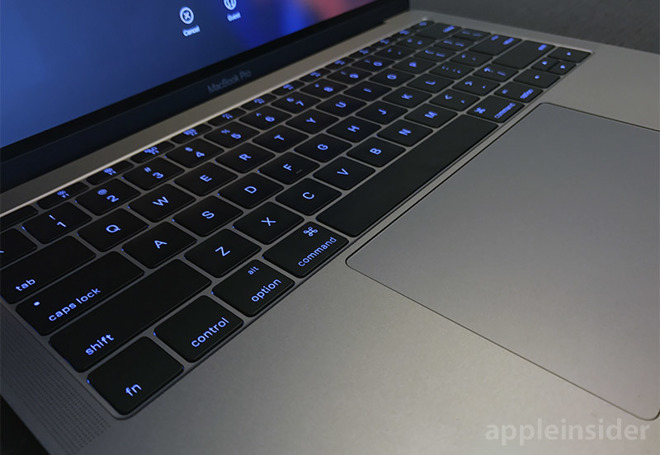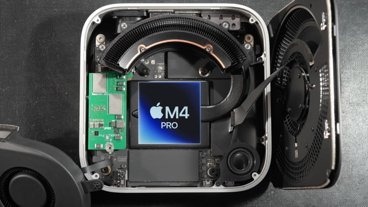Customer complaints over Apple's butterfly keyboard have again turned into legal action, with a class action lawsuit filed in California court on Tuesday claiming the company sold, and continues to sell, a product known to be defective.
Filed in the Northern District Court of California, the complaint echoes many of the claims made in a first class action lawsuit regarding the same issue earlier this month.
In the immediate action, three named plaintiffs allege the butterfly mechanism introduced with the 2015 MacBook, and later applied to the MacBook Pro line in 2016, is prone to failure.
Though Apple advertises the ultra low-profile switch as being more responsive and robust than traditional scissor-type mechanisms, butterfly keyboards are easily defeated when dust or other particles builds up beneath the keys, the lawsuit claims. In some cases, the key switch completely fails, forcing owners to take their laptop in for repairs.
Due to its design, a single broken key necessitates the replacement of an afflicted MacBook's upper casing, which includes the keyboard and battery. For machines no longer covered by Apple's warranty, the repair can cost hundreds of dollars, and for those that are, the process can leave users without their computer for a week or more.
According to the suit, Remy Turner bought his 2016 MacBook Pro in April 2017 and shortly thereafter began to experience problems with a sticky space bar. He attempted to fix the issue using Apple's recommended method of spraying the area with a can of compressed air, but was unable to rectify the issue.
Turner ultimately returned the malfunctioning unit to Best Buy for a replacement, though the same problem manifested. He repeated the replacement process a second time with identical results.
A second named plaintiff, Christopher Martin, purchased a 15-inch MacBook Pro in December 2016 and used the device without incident until August 2017. It was around that time that the unit's space bar began to stick "roughly once every 1 to 2 weeks," a situation that was remedied by a hard press on the key.
The failures began to occur more frequently over time, but the air can cleaning process functioned as a temporary fix. In January 2017, however, Martin's space bar ceased to respond to cleaning techniques and became stuck in the depressed position every couple days, where it would remain for about a week.
As Martin's gratis warranty period is over, he is reluctant to fork out money for the high-priced repair. Instead, the plaintiff has resorted to shaking the laptop until the key becomes unstuck.
Finally, Joey Baruch purchased a 13-inch MacBook Pro in July 2017. Shortly after taking the unit home, he encountered issues with the "R", "T" and "Enter" keys. Like the suit's other plaintiffs, Baruch found spraying beneath the key with a can of compressed air alleviated the problem for a short time, but the issue became progressively worse.
Baruch took his laptop in for warranty repairs in March 2018. Apple replaced the keyboard, but the problem reoccured on the new unit, this time extending to the space bar.
Aside from plaintiff testimonials, the suit cites numerous online forum posts, blog accounts and reports detailing consumer complaints with Apple's butterfly key mechanism. Beyond sticking keys, users describe troubles relating to the design including broken key caps, among other flaws.
Apple introduced the butterfly mechanism in 2015 with the debut of the 12-inch MacBook. At the time, SVP of Worldwide Marketing Phil Schiller touted the keyboard as "much more precise, and accurate. In fact it is four times more stable than that scissor mechanism." Those claims are echoed in Apple's marketing for current-generation MacBook and MacBook Pro models, the latter of which feature a second-generation butterfly mechanism that offers "four times more key stability than a traditional scissor mechanism."
AppleInsider investigated the issue last month, and after collecting data from Genius Bar locations and authorized third-party shops found the 2016 MacBook Pro's keyboard failed roughly twice as often in its first year of use as 2014 and 2015 MacBook Pro models with scissor-type switches.
Within a week of the report's publication, a Change.org petition called on Apple to recall all MacBooks with butterfly switch keyboards. The petition, which is cited in today's suit, has garnered nearly 27,000 signatures in under three weeks.
Though Apple has not acknowledged a widespread problem, it has recognized customer complaints, as evidenced by a support document detailing the aforementioned method of cleaning butterfly keyboards with a can of compressed air.
Plaintiffs assert breach of express warranty, violation of the Magnuson-Moss and Song-Beverly Consumer Warranty Acts, violation of the California Unfair Competition Law and violation of California's Consumer Legal Remedies Act. The suit seeks class certification, restitution, damages and legal fees.
 Mikey Campbell
Mikey Campbell







-m.jpg)






 Marko Zivkovic
Marko Zivkovic
 Mike Wuerthele
Mike Wuerthele
 Christine McKee
Christine McKee
 Amber Neely
Amber Neely
 Sponsored Content
Sponsored Content
 Wesley Hilliard
Wesley Hilliard

 William Gallagher
William Gallagher








27 Comments
This won't cost Apple that much. They calculate these things, and free warranty repairs would probably have cost a lot more than what they can settle this case for.
As others must have said in the 200 comments of the previous article on the subject, Apple has seriously to reconsider its thinness pursuit. Having to shell out 700$ and waste half a several K$ laptop to repair a keyboard key is pure non sense. Apple's balance between aesthetics and maintainability seems completely out of the way in this case, quite badly...
I tried a MacBook Pro at the weekend in the store but the keyboard was absolutely terrible. Hardly any travel at all. Almost like typing on an iPad.
My old MacBook Pro is now 5 years old but there is no way I'm buying a new one with these keyboards. My old machine is superior in that regard.
As the primary interface point with the machine I can't help but think Apple have seriously failed here. Especially given the price of these things.
I know people say that I will get used to it.. but why should I ? OSX is value adding but it's not strong enough to keep me in the Apple camp.
I will wait till June 4th and see what is released but it's looking likely I'm going to have to consider my replacement laptop might not be an apple if the keyboard is still bad.
Aside from personal preference regarding key travel, if a hair falls from your head, gets under a key and prevents proper use of the keyboard, your keyboard has a faulty design. If a speck of dust can do the same, your keyboard has a faulty design. If your keyboard has a faulty design, you need to replace it free of charge if it breaks during normal use in normal environments. Sucks for Apple if they designed it to be in one piece. Come on, this must have been tested.
I’ve had this MacBook since launch day and the keyboard does get debris stuck under the keys easily but it hasn’t failed on me.
I’ve had to spray compressed air under some keys two times only.
However I don’t like the key travel, it’s really shallow. This needs to be addressed.
I don’t know how they can fix the issue with debris screwing the keys up.
A good outcome for me would be if Apple setup up a replacement program for the keyboard affected models and an updated problem free keyboard in future models.
It would be could if existing models could be retrofitted with a V2 keyboard if possible.
I think the issue is blown out of proportion however it is a real issue and needs to be addressed by Apple.